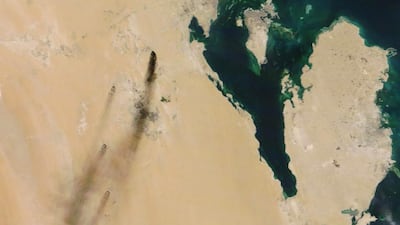Saturday’s attacks on Saudi Arabia’s Abqaiq processing facility and the Khurais oil field, which caused major fires and slowed oil production by almost half, are the latest in a series of attacks by the Iran-backed Houthi rebels on the Kingdom.
The militia claimed the attacks, while US Secretary of State Mike Pompeo said Iran was to blame. Tehran denied any involvement and Iraq said there was no truth to the claim that the attacks may have been launched from its territory.
If confirmed, this would not be the first Houthi attack on Saudi soil, but it represents the most significant targeting of Saudi Arabia's oil infrastructure and the global energy supply since the beginning of the 2015 war in Yemen.
A Saudi Arabian-led coalition that includes the UAE has been fighting the Houthis in Yemen for more than four years on behalf of the internationally recognised government.
In May, another Houthi-claimed drone attack hit the East-West oil pipeline near Riyadh. The pipeline was built during the Iran-Iraq war and runs from Abqaiq in the east to the Red Sea.
Bloomberg reported earlier this year that Saudi Aramco expects to finish expanding it by September, which would mean more oil could be exported from the country without the need for it to travel through the Strait of Hormuz, which is partially controlled by Iran.
The Strait is the world's single most important oil passageway with 20 per cent of global oil supplies flowing through it and it has become the epicentre of rising tensions between Iran, the Gulf countries and the West in recent months. Iran has attacked a number of tankers, seizing a British-flagged tanker and attempting to hijack another.
May’s drone strike caused oil prices to rise by more than $1 a barrel.
Later the same month, the Saudi Arabian military said it shot down two ballistic missiles reportedly heading towards Jeddah and Mecca. The Houthis denied the reports.
In June, the attacks stepped up a gear when Houthi rebels fired a missile at Abha airport in southern Saudi Arabia, wounding 26 civilians in the arrivals hall. Houthi rebels themselves said a week later that they had attacked the airport again. The coalition carried out strikes on the Yemeni capital, Sanaa, in response.
Abha airport was attacked for a third time the following month, wounding nine. Houthis said they had been targeting war planes, yet in August they targeted Jizan Aiport with 10 ballistic missiles and had been aiming for civilians.
In August, a drone attack set off fires at an oil and gas field in the east of the country.

